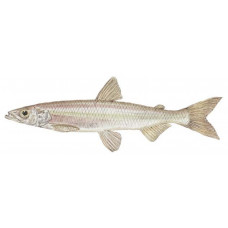Latin name
Osmerus mordax
Other names
American smelt, frostfish, leefish, toothed smelt, freshwater smelt; French: éperlan du nord.
Identification
A slender, silvery fish with a pale green or olive green back. When fresh, the sides of the fish take on a purple, blue, or pink iridescent hue. The scales are large and easy to separate, and during spawning, males develop small tubercles resembling tiny buttons that serve as a sign of their sex. The fish's lower jaw protrudes beyond the upper jaw, and the entire mouth extends beyond the middle of each eye. There are large teeth on the tip of the tongue. One large dorsal fin is located about the middle of the back, and behind it is a small fatty fin.
Distribution
Widely distributed in eastern and western North America, it inhabits coastal waters as well as countless inland freshwater lakes. On the Atlantic coast, it is found from New Jersey in the south to Hamilton Inlet, Labrador, in the north. Populations also exist on the Pacific coast from Vancouver Island north around Alaska and east along the Arctic coast to the Mackenzie River.
Habitat
A pelagic schooling species that inhabits inland coastal areas and middle lake waters. Because it is sensitive to both light and warmer temperatures, its aggregations are usually concentrated near the bottom of lakes and coastal waters during daylight hours.
Size
They do not exceed 8 inches in length, although some coastal specimens reach 14 inches. They can live for at least 6 years.
Life history and Behavior
In spring, anadromous adults migrate upstream to freshwater spawning grounds. Spawners reach the high tide in major tributaries when water temperatures are only 39-41 °F. Spawning occurs at night, usually on the gravel bottom. The fish remain at the spawning sites for several days before migrating downstream. Shortly after spawning, many males die. Some become sexually mature at age 2, and all at age 3.
Food and feeding habits
The diet consists of zooplankton, insect larvae, aquatic worms, and small fish, with zooplankton predominating.
Reproduction
No information
| Classification | |
| Phylum | Chordata |
| Class | Actinopterygii |
| Squad | Osmeriformes |
| Family | Osmeridae |
| Genus | Osmerus |
| Species | O. mordax |
| Features | |
| Conservation status | Least Concern |
| Habitat | Littoral |
| Life span, years | No information |
| Maximum body weight, kg | 0.085 |
| Maximum length, cm | 30.48 |
| Sailing speed, m/s | No information |
| Threat to people | Edible |
| Way of eating | Predator |


